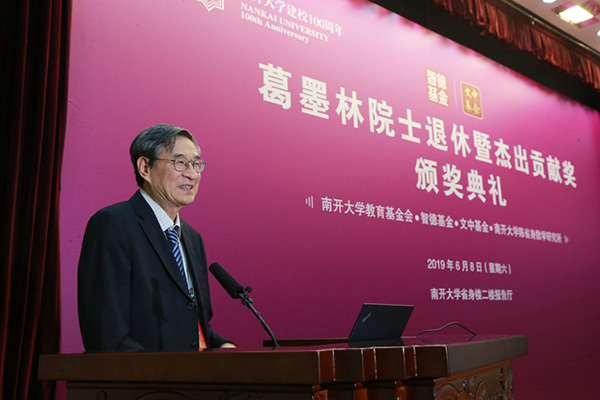Academician Ge Molin: Dedicating Himself to Scholarship

Academic Adversity
Born in Beijing, Ge Molin enrolled at Beijing No.13 High School after the founding of New China. In 1956, facing graduation from high school, Ge Molin originally planned to apply for the Department of Electrical Engineering at Tsinghua University. However, as he said, “I was approached by a teacher at the school, who said that the country planned to strengthen the Department of Nuclear Physics at Lanzhou University, and that a group of outstanding students would be selected from Beijing and Shanghai to apply for the exam, in order to strengthen the country's national defense forces and reserve talents for the country's nuclear research. I zealously responded to the call as well as obeyed the school's allocation, and applied for the exam without hesitation.”
With excellent college entrance examination results and strong political awareness, Ge was successfully admitted to the Physics Department of Lanzhou University. However, he was not selected to major in nuclear physics after he went to the university with the ambition to serve his country in that field.
Misfortune May Be a Blessing in Disguise
Instead of entering the nuclear physics department, Ge chose to pursue his preferred major in theoretical physics.
“Take things as they come. Since I couldn't return from Lanzhou to Beijing, I chose to stay and concentrate on my studies. Later, I chose to take graduate studies under the supervision of Mr. Duan.” It was under Mr. Duan Yishi's rigorous education that Ge laid a solid foundation for himself in both mathematics and physics.
Prof. Duan opened a door for Ge Molin. But before Ge could show his talent, a storm was brewing.
Persistence in the Storm
After experiencing some political disturbances, Mr. Ge chose to keep a low profile. However, he did not escape from the Cultural Revolution that began in 1966.
Mr. Ge Molin was transferred to do manual labor, and later returned to school to take care of his pregnant wife. But he was still required to do manual labor such as emptying manure and heating boilers. During those difficult years, Ge did not choose to lose hope. Even during the years of labor, he was optimistic about exploring his own interests.
“No matter where and what the conditions are, a researcher can't leave the research behind. We used to do our studies late at night. So it was common for us to go to bed at two o'clock at night and get up at six or seven o'clock in the morning. You can have a sense of inner peace only if you return to the field you love.”
The Talented Next to the Master
In 1980, at an academic conference in Guangzhou, Mr. Yang Chen-Ning directly invited Prof. Ge Molin to his institute for a working visit, which opened yet another realm of Mr. Ge Molin's scholarship.
“I feel that I was so lucky because I met Mr. Duan Yishi when I was a student and Mr. Yang Chen-Ning later, who has been leading me in research, while others might never have had a good teacher or mentor in their whole life. Meeting with Mr. Yang Chen-Ning has changed my life.”
Academia State
In Mr. Ge's view, a person who can do research must also be capable of taking on teaching. He said so and did so. While he was teaching in the Physics Department of Lanzhou University, he was regarded by students as one of the four pillars of the department. His special personality was also liked by the students.
In academician Ge Molin's view, teaching students is a vocation that needs a sense of responsibility. Only with a sense of responsibility can one work harder. This sense of responsibility originates from a sincere heart for the motherland and the people.
Mr. Ge has trained a number of graduate students at Nankai, who are now active in the Chinese physics community. They love their country and work hard with a rigorous learning style while maintaining close contact with their teacher.
Nowadays, having faced some shortcomings in research and teaching, academician Ge Molin is very upset. He proclaims that “lawmakers should not be lawbreakers”: “I insist on the way I train graduate students and cultivate their individuality. My students do not graduate as if they are on an assembly line. Just like in a swimming pool, let them swim with their own inspiration, which is the best way to learn to swim. And I, as a teacher, just need to remind each of them of the depth of the water and the right direction.”










